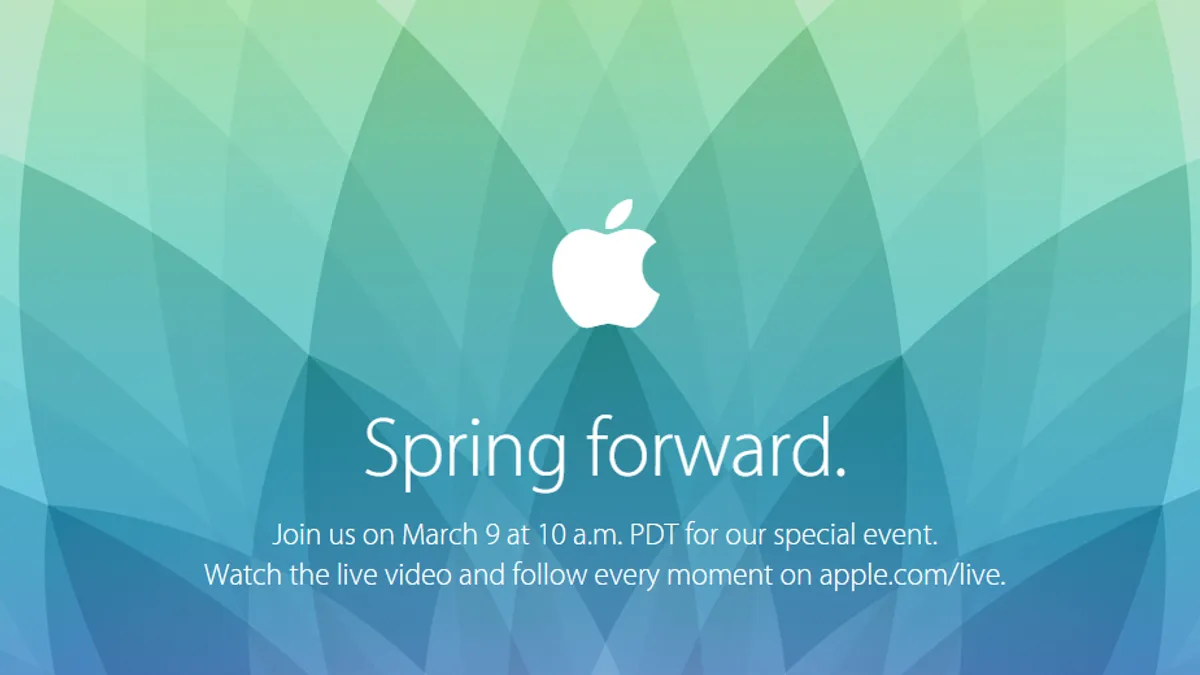The buzz is building.
On March 9, Apple says it will reveal something at its invite-only “Spring Forward” event in San Francisco. And that something, industry observers say, is probably the new Apple Watch it has been talking up for months.
Apple CEO Tim Cook is just winding up a tour promoting the new smartwatch, touting its potential to replace car keys and other capabilities. There’s also a 12-page advertising spread in Vogue's March issue showing off various configurations.
So while the tech media and consumers have heard quite a bit about the product, the company still has everyone on the edges of their seats waiting for the official unveiling.
Showmanship sells
This kind of theater has become an expectation of Apple announcements since Steve Jobs rejoined the firm in the 1990s. Alone onstage in a black turtleneck, Jobs popularized the big tech reveal, pulling 1,000 songs from his pocket or a super-slim Macbook Air from a manila envelope, to onlookers’ delight.
Before the 2012 debut of the iPhone 5, for example, Apple called a press conference, “but didn’t say what the press announcement was about,” wrote marketing expert Catherine Kaputa, author of Breakthrough Branding. “In essence, Apple created a cliffhanger as the media and bloggers speculated, 'What could it be—the new iPhone 5, or something else?' [The speculation] generated phenomenal consumer interest—for free.”
Seeing its impact in “earned” media mentions, other tech companies have since copied the format. But with almost unlimited cash-on-hand and a cultish fan following, why would a $775 billion company continue to pursue such a strategy?
For one thing, it allows the company to exercise an element of control over the news.
“Not only do these events ensure a captive audience of all the major tech writers for a day, they also provide a form of control over the otherwise unregulated editorial review process,” Lindsey Carnett, CEO of the Los Angeles-based public relations agency Marketing Maven, told Retail Dive.
Many companies still mail editors an information packet and a sample and hope for the best, she says. But Apple’s buildup ensures that whatever the product is has the full attention of reviewers and fans, who get the same information simultaneously.
The appeal of limited wonder
Assuming the March 9 event does focus on the Apple Watch, various members of the Apple team will take the stage to discuss options, accessories, apps, battery life, and pricing—details it has glossed over since announcing the forthcoming release alongside the new iPhone 6 last fall. Then, there will likely be a short, hands-on demonstration.
“If the last Apple Watch event is any indicator, the editors will be given just enough time to experience the wonder of the new product, but not enough time to find any flaws,” Carnett says. “This limited product time leaves the editors wanting more, and anticipating when they can do a full review.”
A demo also has the effect of building consumer familiarity and demand.
“By allowing a limited hands-on experience, Apple will be able to give their consumers a taste of how their new Apple Watch OS works,” Carnett says. “The more exposure Apple is able to earn [for the OS], the more the consumer will understand how to use the product before it even hits retail. As hordes of consumers flock to retail stores to purchase the Apple Watch in record numbers—as is common for Apple products—consumers will feel that the Apple Watch is ‘familiar’ and ‘easy to use’ right out of the box.”
Staging a media coup
Beyond garnering massive amounts of media mentions from news outlets, bloggers, and aficionados, the Apple event also undercut mobile competitors’ attempts to create buzz as they readied new smartphone pitches half a world away this week.
“The value of this event goes beyond impressions or CPMs showing ad equivalency,” Carnett says. “Starting with the invitation, Apple was able to successfully increase its share of media attention, which was otherwise focused on the Mobile World Congress in Barcelona. Other tech companies are now left to ‘wow’ the media at the Mobile World Congress to earn additional media placements, which were stolen by Apple."
“There is value in generating placements for your own product, but there is also value in keeping your competitors in the dark,” she notes. “Apple capitalizes on both.”















